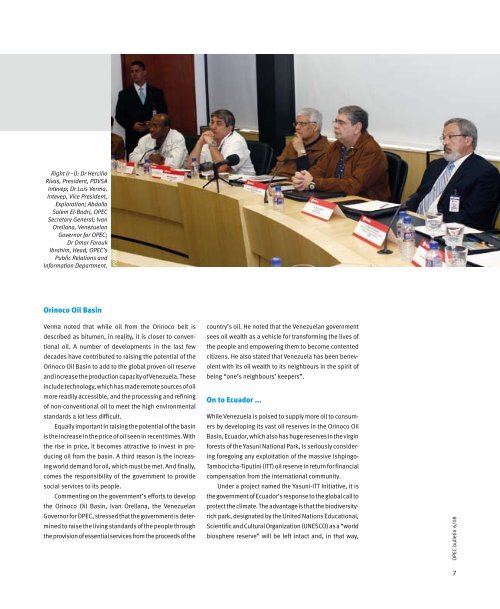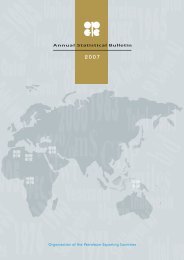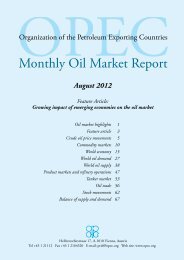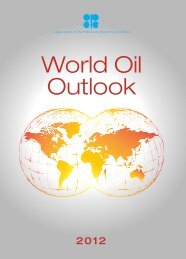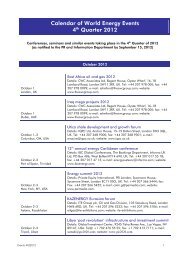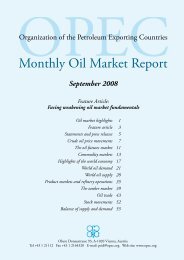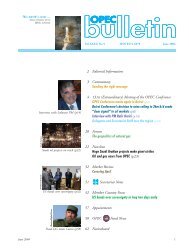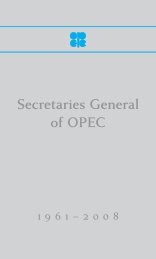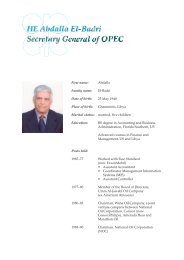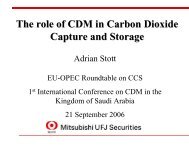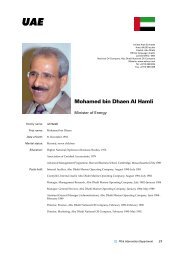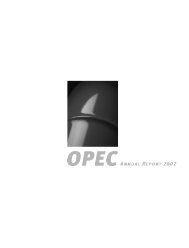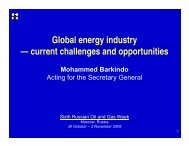You also want an ePaper? Increase the reach of your titles
YUMPU automatically turns print PDFs into web optimized ePapers that Google loves.
Right (r–l): Dr Hercilio<br />
Rivas, President, PDVSA<br />
Intevep; Dr Luis Verma,<br />
Intevep, Vice President,<br />
Exploration; Abdalla<br />
Salem El-Badri, <strong>OPEC</strong><br />
Secretary General; Ivan<br />
Orellana, Venezuelan<br />
Governor for <strong>OPEC</strong>;<br />
Dr Omar Farouk<br />
Ibrahim, Head, <strong>OPEC</strong>’s<br />
Public Relations and<br />
Information Department. PDVSA<br />
Orinoco Oil Basin<br />
Verma noted that while oil from the Orinoco belt is<br />
described as bitumen, in reality, it is closer to conventional<br />
oil. A number of developments in the last few<br />
decades have contributed to raising the potential of the<br />
Orinoco Oil Basin to add to the global proven oil reserve<br />
and increase the production capacity of Venezuela. These<br />
include technology, which has made remote sources of oil<br />
more readily accessible, and the processing and refining<br />
of non-conventional oil to meet the high environmental<br />
standards a lot less difficult.<br />
Equally important in raising the potential of the basin<br />
is the increase in the price of oil seen in recent times. With<br />
the rise in price, it becomes attractive to invest in producing<br />
oil from the basin. A third reason is the increasing<br />
world demand for oil, which must be met. And finally,<br />
comes the responsibility of the government to provide<br />
social services to its people.<br />
Commenting on the government’s efforts to develop<br />
the Orinoco Oil Basin, Ivan Orellana, the Venezuelan<br />
Governor for <strong>OPEC</strong>, stressed that the government is determined<br />
to raise the living standards of the people through<br />
the provision of essential services from the proceeds of the<br />
country’s oil. He noted that the Venezuelan government<br />
sees oil wealth as a vehicle for transforming the lives of<br />
the people and empowering them to become contented<br />
citizens. He also stated that Venezuela has been benevolent<br />
with its oil wealth to its neighbours in the spirit of<br />
being “one’s neighbours’ keepers”.<br />
On to Ecuador ...<br />
While Venezuela is poised to supply more oil to consumers<br />
by developing its vast oil reserves in the Orinoco Oil<br />
Basin, Ecuador, which also has huge reserves in the virgin<br />
forests of the Yasuni National Park, is seriously considering<br />
foregoing any exploitation of the massive Ishpingo-<br />
Tambocicha-Tiputini (ITT) oil reserve in return for financial<br />
compensation from the international community.<br />
Under a project named the Yasuni-ITT Initiative, it is<br />
the government of Ecuador’s response to the global call to<br />
protect the climate. The advantage is that the biodiversityrich<br />
park, designated by the United Nations Educational,<br />
Scientific and Cultural Organization (UNESCO) as a “world<br />
biosphere reserve” will be left intact and, in that way,<br />
<strong>OPEC</strong> bulletin 6/08<br />
7


